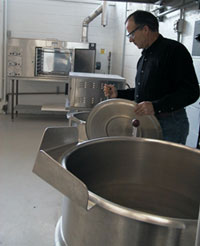
FULL STEAM AHEAD - Chris Turpin is coordinating the new Agribusiness Development program at College of the North Atlantic, Carbonear. The secondary processing facility on campus, with its large kettles and drying ovens will be incorporated into the course.
~ Photo by Lillian Simmons/The Compass